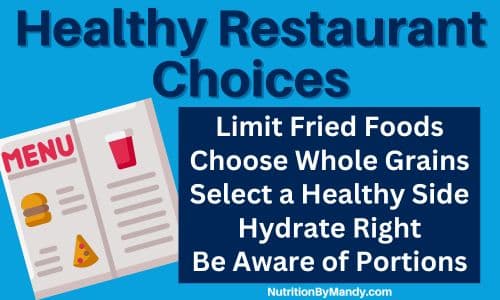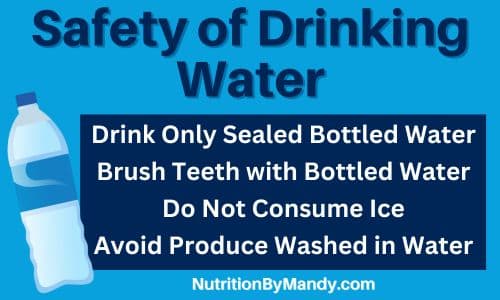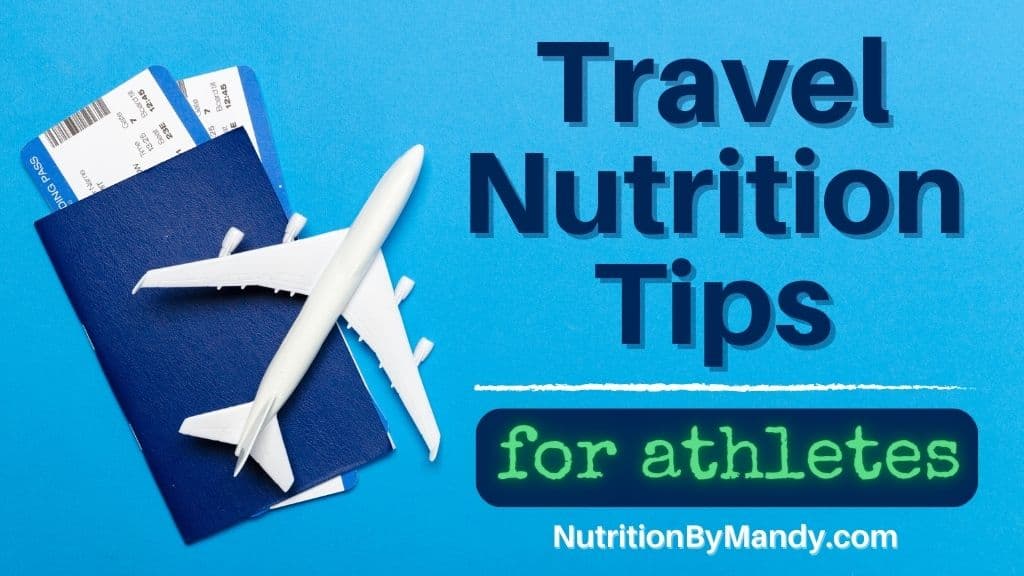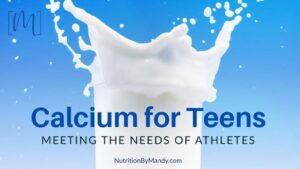Last Updated on April 27, 2025 by Mandy Tyler, M.Ed., RD, CSSD, LD
9 Practical Travel Nutrition Tips for Athletes
*This article includes affiliate links. As an Amazon Associate, I earn from qualifying purchases.
It can be helpful for athletes to be equipped with travel nutrition strategies to support optimal performance on the road.
Let’s explore 9 key travel tips to help athletes with meeting their sports nutrition needs during their trip.
9 Travel Nutrition Tips for Athletes
#1 Plan Ahead
Prior to leaving on a trip, there are several steps that athletes can take to ensure they are prepared to meet their nutrition needs.
First, athletes should consider their mode of transportation for the trip. The type and amount of food and beverages an athlete can take on a trip will vary based on if they travel by car, on a team bus, or via airplane.
Second, athletes need to consider where they are staying. If staying in a hotel, athletes should find out ahead of time if the room is equipped with a mini-fridge and microwave.
If these do not come standard in the room, many hotels will provide a mini-fridge upon request. In addition, the hotel may have a microwave available for guests to use.
Finally, athletes should take into account their competition schedule. Key considerations include:
- Are there early morning games when a quick breakfast on-the-go will be needed?
- Is the athlete competing in tournament play requiring the need for between game snacks?
- Does the athlete have back-to-back games with limited time for meeting recovery nutrition needs?
Thinking through these situations in advance can help athletes ensure they are prepared to meet their sports nutrition needs on the road.
#2 Airplane Travel Nutrition Tips
If traveling by airplane, athletes need to be familiar with the Transportation Security Administration’s (TSA) guidelines for liquids.
TSA 3-1-1 Rule
The TSA 3-1-1 rule provides guidelines for the size and total amount of liquids, gels, and aerosols that may be carried through the security check-point.
The 3-1-1 rule for liquids, gels, and aerosols packed in carry-on-luggage is:
- 3: Containers must be 3.4 oz (100 ml) in size or less
- 1: All liquids must fit in 1 quart size, clear, plastic, zip top bag
- 1: 1 zip top bag is allowed per passenger
This means that athletes cannot carry full water bottles, sports drinks, or ready-to-drink protein shakes through security.
In addition, certain food items are considered liquids (nut butter, yogurt, hummus, sports gels, honey) and must comply with the size requirements.
Travel Nutrition Tip: Pack Healthy Snacks for the Airplane
I recommend that athletes pack healthy snacks to take with them to eat at the airport and on the plane. Having a variety of snacks available can also come in handy if there is a flight delay (1).
For ideas on what snacks to pack for the plane, take time to review my blog on the best airplane snacks for athletes.

#3 Healthy Food While Traveling
Prior to traveling, it can be helpful for athletes to research what grocery stores and restaurants are located in close vicinity to their hotel.
In addition, athletes should explore what grocery stores and restaurants provide delivery services. Many business will provide delivery either through their website or through a third-party service, such as DoorDash or Uber Eats.
Athletes should take time to review the menu information and hours of operation of nearby restaurants so they have ideas for meals during their hotel stay.
Healthy Restaurant Choices
Athletes should also be prepared with how to make healthy choices at fast-food and casual dining restaurants when traveling.
General tips for making healthy choices at restaurants include:
- Limit fried foods – Instead, opt for items that are grilled, baked, steamed, or roasted.
- Choose whole grains – When available, select whole grain bread, buns, and wraps for sandwiches, as well as brown rice for burrito bowls.
- Select a healthy side item – Choose items such as apple slices, fruit cups, yogurt parfaits, side salads, and steamed veggies to eat with the meal.
- Hydrate right – Choose water, unsweet tea, low-fat milk, or 100% fruit juice over sodas and other sugar-sweetened beverages.
- Be aware of portion sizes – Avoid the temptation of super-sizing your meal. It is best to enjoy the meal in moderation and then have a balanced snack later in the day if hungry.
Athletes can download my free Healthy Eating Out Guide for Athletes to take with them on their trip.

#4 Hydration while Traveling
Hydration is important for an athlete’s health and sports performance. Thus, athletes should make it a priority to stay on top of their hydration needs while traveling.
When packing for the trip, athletes should make sure to bring an empty, reusable water bottle to use on the road.
In addition, athletes should pack individual packets of their favorite sports drink mix. This way athletes can ensure that they have their desired flavor and brand of sports drink when competing.
Travel Nutrition Tip: Stay Hydrated When Traveling by Plane
When traveling by plane, athletes should be mindful that the lower humidity levels and reduced oxygen pressure in the airplane cabin will increase fluid loss and risk of dehydration (2).
During long flights, it is recommended that athletes consume 100-300 mL of fluid per hour (~4-10 oz) through both foods and beverages. Athletes may consider selecting a beverage that contains electrolytes and carbohydrates (i.e., sports drink) during the flight to support their hydration needs (2).
In addition, athletes have an increased risk of dehydration when traveling to higher altitudes or extremely hot or cold environments (3). Thus, athletes should consider working with a sports dietitian nutritionist to develop an individualized hydration plan for the trip.
#5 Hotel Travel Nutrition Tips
One of my top travel nutrition tips for athletes is to ensure they have food and drinks available in their hotel rooms to support their nutrition needs.
Athletes should not rely on the hotel vending machine to have food available that will optimally fuel their performance.
Athletes can either pack food to take with them to eat at the hotel or go grocery shopping upon arrival. Having food available in the hotel room can help save athletes money from eating out and also ensure they are fueled for performance.
My recent blog on hotel room food ideas provides a variety of easy meals and snacks athletes can enjoy during their hotel stay.

Make Healthy Choices at the Hotel Breakfast Buffet
If athletes plan to eat breakfast at the hotel breakfast buffet, they should be selective in their choices.
Items such as donuts, pastries, biscuits, croissants, bacon, sausage, cream cheese, gravy, and butter all tend to be high in saturated fat.
Saturated fat is associated with increased inflammation in the body (4). Thus, foods high in saturated fat are less nutritious choices for athletes.
Instead, athletes can opt for healthier items at the hotel breakfast buffet, such as:
- Fresh fruit
- Greek yogurt
- Cottage cheese
- Hard-boiled eggs
- Turkey or chicken sausage
- Oatmeal, whole grain breakfast cereals
- Bagels, English muffins, whole wheat toast
- Nuts and nut butters
- Low-fat milk, 100% fruit juice
#6 Promoting Sleep While Traveling
Athletes should also take steps to ensure they get quality sleep while traveling. To the extent possible, athletes should aim to follow a similar sleep routine as they do at home.
Prior to going to bed, athletes should create an optimal sleep environment in their hotel room.
Tips for creating an ideal sleep environment include (5):
- Make the room cool, dark, and quite (like a cave).
- Ensure the hotel room shades are pulled fully shut to block outside light.
- Place the “Do Not Disturb” sign on the hotel room door to prevent undesired interruptions.
- Travel with an eye mask and ear plugs to use in the event you cannot get the room dark enough or the hotel is noisy.
- Turn the television off at least 30 minutes before bed. Athletes should avoid falling asleep watching TV.
- Limit the use of electronics, including smartphones, tablets, and laptops, in the 30 minutes before bed.
- Consider traveling with blue light blocking glasses (available on Amazon) to wear in the evening hours.

#7 Pre- and Post-Game Meals When Traveling
Athletes should plan ahead on how they will meet their pre- and post-game nutrition needs on the road.
When planning what to eat before a competition, athletes should aim to have familiar foods available that they feel comfortable with eating prior to activity.
When possible, the pre-game meal should be eaten ~3-4 hours prior to competition. Athletes should include foods that are high in carbohydrates as well as foods that provide a moderate amount of protein with the pre-game meal.
Pre-Game Meal Ideas on the Road
Pre-game meal ideas that athletes can enjoy when traveling include:
- Bagel with nut butter, fruit smoothie
- English muffin with ham and egg, Greek yogurt and fruit parfait
- Pasta with marinara sauce and grilled chicken, breadsticks
- Turkey sub sandwich, pretzels, apple slices

Post-Game Meals When Traveling
Following a competition, athletes should have plans in place for how they will meet their recovery nutrition needs.
Recovery nutrition is particularly important for athletes when they have limited time (< 24 hours) between competitions. An example would be athletes competing in a tournament competition or playing back-to-back games.
The three key areas of recovery nutrition include:
- Reyhdrate: Replace fluid and electrolytes lost in sweat
- Refuel: Consume carbohydrates to refill energy stores
- Build and Repair: Consume protein to build and repair muscles
Post-Game Meal Ideas on the Road
Ideas for post-game meals that athletes can enjoy when traveling at restaurants include:
- Chipotle Bowl: Burrito bowl made with grilled chicken or steak, rice, black beans, corn salsa, lettuce, tomatoes, guacamole, and a tortilla on the side
- CAVA Bowl: Greens and grains bowl with brown rice, grilled chicken, leafy greens, variety of veggie toppings, pita chips, and hummus
- Texas Roadhouse Steakhouse: Sirloin steak, sweet potato, steamed broccoli, dinner rolls
- Jason’s Deli: Turkey sandwich, fresh fruit cup, baked chips
- Chick-fil-A: Grilled chicken sandwich, fresh sliced fruit cup, chicken noodle soup
- Maggiano’s Little Italy: Spaghetti with meat sauce, Italian wedding soup, tossed salad, ciabatta rolls
Check out my blog on planning team meals for away games to get additional ideas for pre- and post-game meals.
#8 Food Safety While Traveling
It is important for athletes to take food safety into consideration when traveling. The first proactive step an athlete can take towards food safety is washing their hands.
Athletes should be intentional about washing their hands prior to handling, preparing, or eating food.
When athletes do not have access to soap and water to wash their hands, the Centers for Disease Control and Prevention recommends using an alcohol-based hand sanitizer. The hand sanitizer should contain at least 60% alcohol.
Thus, when packing for the trip I recommend athletes carry a small container of hand sanitizer with them in their travel bag.

Holding Food at Correct Temperatures
In addition to handwashing, holding foods at the correct temperature is another critical aspect of food safety.
The Centers for Disease Control and Prevention defines the temperature range between 40°F and 140°F, as the “Danger Zone” in which bacteria can rapidly grow.
Perishable foods should not be left sitting in the temperature danger zone for more than 2 hours. This time frame decreases to 1 hour if the temperature exceeds 90 °F, such as at an outdoor game.
Food left in the temperature danger zone over the recommended time frames should be thrown away. Athletes do not want to risk getting a foodborne illness while on the trip.
As a reminder, this applies to all perishable foods, including those commonly left sitting out, such as deli sandwiches or pizza.
#9 Foreign Travel Nutrition Tips
Traveling out of the country can pose additional challenges for athletes in meeting their sports nutrition needs.
Food safety standards in foreign countries may differ from those in the United States (1). Thus, it is important that athletes use extra caution with planning how to meet their nutrition needs when traveling abroad.
Consider the nutrition tips below when planning travel to foreign countries.
Safety of Drinking Water
Prior to leaving on the trip, athletes need to find out if the water at their destination is safe to drink. If the water is not safe to drink, athletes need to be mindful not to drink the water nor consume the water in other ways.
Recommendations include (1, 6):
- Only drink sealed bottled water. Athletes should not drink tap water, water served from pitchers at meals, nor drinks made with water (i.e., iced tea, sports drink powder mixed into the water).
- Use bottled water to brush teeth.
- Avoid the use of ice in drinks.
- Do not consume produce that has been washed in water (i.e., salads)
- Peel fresh fruit prior to eating

Food Safety with Foreign Travel
Since food safety standards in foreign countries may differ from those in the United States, athletes should also use caution when purchasing ready-to-eat foods.
For example, athletes should not purchase foods from street vendors or food carts. In addition, athletes should not consume raw foods, such as sushi or eggs, nor unpasteurized dairy products (1, 6).
Prior to the trip, athletes should research what area restaurants are recommended (1). If traveling with a team, a sports dietitian nutritionist, can assist with developing a list for the team of recommended restaurants and locations to purchase food from.
Supplements and Medications
Finally, athletes should be cautious with the purchase of any sports supplements, herbal supplements or remedies, or medications when traveling abroad.
Supplements contain the risk of being contaminated with banned substances that could be harmful to an athlete’s health or performance (7). Due to this risk, athletes should consult with a sports dietitian nutritionist prior to taking any supplements.
In addition, athletes should only purchase supplements that have been third-party certified by a recognized agency. When traveling, finding third-party tested supplements can be a challenge.
Thus, athletes should pack and take with them any supplements (i.e., protein powder, vitamins) they will need for the duration of the trip.
In addition, athletes can visit with their physician for guidance on any medications they should travel with in case they get sick during the trip.
9 Practical Travel Nutrition Tips for Athletes
You are now set with 9 travel nutrition tips to help ensure that athletes are prepared to meet their sports nutrition needs on the road.
For additional sports nutrition tips for the traveling athlete, check out my blog on the best gas station drinks for athletes.
If you are interested in a more in-depth look at travel nutrition, I co-authored a full chapter on travel nutrition strategies in the Clinical Nutrition in Athletic Training textbook (available on Amazon).
Join the Nutrition By Mandy Email List & Get a Free Athlete’s Grocery List
Click HERE to join the Nutrition By Mandy e-mail list. When you join you will receive a free athlete’s grocery list to print and take with you to the store.
About the Author
Mandy Tyler is a Sports Dietitian Nutritionist in the San Antonio, TX area. She is a Registered and Licensed Dietitian, a Board-Certified Specialist in Sports Dietetics, a Licensed Athletic Trainer, and is a Certified Exercise Physiologist through the American College of Sports Medicine. Mandy has experience working with athletes at the high school, collegiate, and professional levels. She believes the key to reaching one’s full potential, both in everyday life and in sports performance, relies on a healthy nutritional foundation.

If you are looking to take your performance to the next level, make sure to check out my new Sports Nutrition Game Day Guide. This downloadable guide is written to help athletes develop an individualized plan to achieve peak performance on game day.





